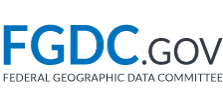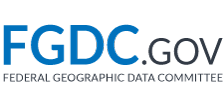The U.S. Office of Management and Budget and the U.S. Congress set policy for Federal agencies. The Federal Geographic Data Committee (FGDC), a federal interagency coordinating committee established in law acts as the lead entity in the executive branch for the development, implementation and review of policies, practices, and standards relating to geospatial data.
FGDC | Policies & Planning - Read More
This policy articulates the Federal Geographic Data Committee’s (FGDC) endorsement of public access to information and appropriate protections for the privacy and confidentiality of personal information in federal geospatial databases. The policy supports the goals of the FGDC, and is in conformance with law, related federal policies, and well-regarded fair information and privacy practices and principles.
FGDC | Policy | Access to Public Information and Protection of PII (PDF) - Read More
The overall purpose of these policy statements is to facilitate full and open access to Federal geographic data by Federal users and the general public. They were prepared in consonance with the goals of the Federal Geographic Data Committee, Office of Management and Budget Circular A-16, the Data Management for Global Change Research Policy Statements, and the proposed revision of Office and Management and Budget Circular A-130. As such, they represent the U.S. Government’s position on access to Federal geographic data.
FGDC | Policy | Data Sharing (PDF) - Read More
The FGDC Steering Committee has endorsed the following policies and guidelines to promote data sharing, ensure appropriate access to spatial data and protect personal privacy in spatial databases.
FGDC | Policy | Endorsed Policies (HTML) - Read More
This resource provides a curated list of Executive Orders that apply to the FGDC.
FGDC | Policy | Executive Orders - Read More
FGDC Policy on Access to Public Information and the Protection of Personal Information Privacy in Federal Geospatial Databases This policy articulates the Federal Geographic Data Committee’s (FGDC) endorsement of public access to information and appropriate protections for the privacy and confidentiality of personal information in federal geospatial databases. The policy supports the goals of the FGDC, and is in conformance with law, related federal policies, and well-regarded fair information and privacy practices and principles. This policy is needed because federal geospatial databases are being built with increasing levels of geographic specificity and often include personal information. For example, individual’s names are often linked to property addresses and street maps; cadastral records that identify land parcels and land owner names may be linked to high resolution imagery. Privacy concerns are raised because databases may contain personal information prohibited from disclosure by law. Privacy in this context means “information privacy,” an individual’s claim to control the terms under which personal information—information identifiable to an individual—is acquired, disclosed, and used.1 The FGDC Steering Committee endorsed this policy in April 1998.
FGDC | Policy | Geospatial Information Access and Privacy (HTML) - Read More
The Federal Geographic Committee (FGDC) includes as its core, a vision for a Spatial Data Infrastructure (SDI) that supports local to global interests. Acceleration of global SDI initiatives is a high priority of the FGDC. Therefore, the FGDC commits its resources wherever possible to share experiences and work with other countries in the development of national Spatial Data Infrastructures (SDI), and to provide additional momentum for the establishment of Regional and Global Spatial Data Infrastructures. Furthermore, the FGDC is committed to maintaining an International Activities Coordination staff position to assure continued focus and US leadership presence in global SDI initiatives. The NSDI, regional SDI's, and the Global Spatial Data Infrastructure have common goals to promote information sharing, greater interoperability, and to enable sound decision-making at all levels. The FGDC will assist other nations where possible by sharing our experiences and resources, and will establish partnerships for the betterment of SDI efforts internationally.
FGDC | Policy | Support for International Infrastructure Activities International (PDF) - Read More
Guidelines for Providing Appropriate Access to Geospatial Data in Response to Security Concerns. Many public, private, and non-profit organizations originate and publicly disseminate geospatial data. Dissemination is essential to the missions of many organizations and the majority of these data are appropriate for public release. However, a small portion of these data could pose risks to security and may therefore require safeguarding. Although there is not much publicly available geospatial information that is sensitive (Baker and others, 2004, page 123), managers of geospatial information have safeguarded information using different decision procedures and criteria. The guidelines provide standard procedures to: 1. Identify sensitive information content of geospatial data that pose a risk to security. 2. Review decisions about sensitive information content during reassessments of safeguards on geospatial data. Additionally, the guidelines provide a method for balancing security risks and the benefits of geospatial data dissemination. If safeguarding is justified, the guidelines help organizations select appropriate risk-based safeguards that provide access to geospatial data and still protect sensitive information content.
Policy | Access Guidelines - Read More

